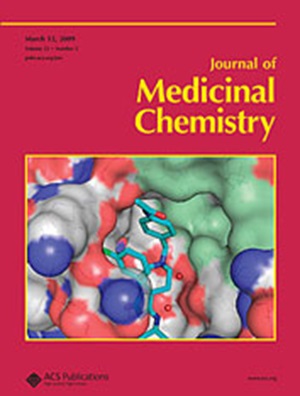Dual Transcriptional Repression of Oncogenic c-KIT and KRAS by G4-Targeting Triazolyl-Indole Scaffolds Induces Synthetic Lethality in Leukemia Cells.
IF 6.8
1区 医学
Q1 CHEMISTRY, MEDICINAL
引用次数: 0
Abstract
In this study, we report the design and synthesis of a triazolyl-indole derivative, TI12, which induces synthetic lethality in K562 leukemia cells by preferentially targeting G-quadruplexes (G4s) in the promoter regions of c-KIT1 and KRAS. Among a series of synthesized triazolyl-indole derivatives, TI12 exhibits submicromolar affinity for these G4s, as confirmed by biophysical assays along with molecular docking and simulations. Biological studies demonstrate that TI12 represses c-KIT and KRAS transcription, leading to G1-phase cell cycle arrest, ROS-mediated DNA damage, and apoptosis. Notably, TI12 does not affect cells overexpressing either c-KIT or KRAS, suggesting that its cytotoxicity arises from the simultaneous suppression of both oncogenes. In vivo studies depicted the potential antitumor efficacy of TI12 with minimal systemic toxicity. This study highlights the potential of G4-targeting ligands as synthetic lethal agents, offering a novel strategy for disrupting cooperative oncogenic pathways in leukemia.g4靶向三唑吲哚支架对致癌c-KIT和KRAS的双重转录抑制诱导白血病细胞的合成致死
在这项研究中,我们设计和合成了一种三唑基吲哚衍生物TI12,它通过优先靶向c-KIT1和KRAS启动子区域的g -四联体(G4s)诱导K562白血病细胞的合成致死。在一系列合成的三唑基吲哚衍生物中,TI12对这些G4s具有亚微摩尔亲和力,这得到了生物物理实验以及分子对接和模拟的证实。生物学研究表明,TI12抑制c-KIT和KRAS转录,导致g1期细胞周期阻滞、ros介导的DNA损伤和细胞凋亡。值得注意的是,TI12不影响过表达c-KIT或KRAS的细胞,这表明其细胞毒性来自于同时抑制两种致癌基因。体内研究表明,TI12具有潜在的抗肿瘤功效,且具有最小的全身毒性。这项研究强调了g4靶向配体作为合成致死药物的潜力,为破坏白血病的协同致癌途径提供了一种新的策略。
本文章由计算机程序翻译,如有差异,请以英文原文为准。
求助全文
约1分钟内获得全文
求助全文
来源期刊

Journal of Medicinal Chemistry
医学-医药化学
CiteScore
4.00
自引率
11.00%
发文量
804
审稿时长
1.9 months
期刊介绍:
The Journal of Medicinal Chemistry is a prestigious biweekly peer-reviewed publication that focuses on the multifaceted field of medicinal chemistry. Since its inception in 1959 as the Journal of Medicinal and Pharmaceutical Chemistry, it has evolved to become a cornerstone in the dissemination of research findings related to the design, synthesis, and development of therapeutic agents.
The Journal of Medicinal Chemistry is recognized for its significant impact in the scientific community, as evidenced by its 2022 impact factor of 7.3. This metric reflects the journal's influence and the importance of its content in shaping the future of drug discovery and development. The journal serves as a vital resource for chemists, pharmacologists, and other researchers interested in the molecular mechanisms of drug action and the optimization of therapeutic compounds.
 求助内容:
求助内容: 应助结果提醒方式:
应助结果提醒方式:


